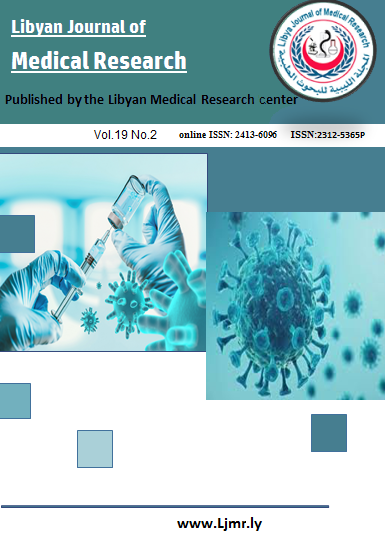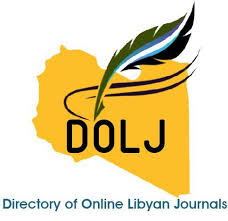Pharmacy Practitioners Regarding Abuse and Misuse of Prescription and Non-Prescription Drugs in Zawia City-Libya: A Cross-Sectional Study
DOI:
https://doi.org/10.54361/LJMR.19.2.02Keywords:
Prescription drugs, OTC drugs, Abuse, Misuse, Community Pharmacy practitioners, Libya.Abstract
Background and Aim: The misuse and abuse of prescription and over-the-counter drugs present a significant global public health concern, particularly in Libya, where there is a lack of information regarding the knowledge and perspectives of community pharmacy personnel on this issue. This study aims to assess the knowledge, attitudes, and experiences of community pharmacy practitioners concerning the misuse/abuse of prescription and non-prescription medicines. To identify the strategies employed to mitigate drug misuse and abuse. Material and Methods: A cross-sectional study utilizing a standardized questionnaire was undertaken among 170 community pharmacy practitioners in Zawia City between January and March 2023, with data analysis conducted using SPSS. Results: Out of the 170 participants surveyed, 150 provided responses, yielding insights that 77.9% of respondents were able to differentiate between drug abuse and misuse.81.3% believed that some OTC medicines were being misused /abused in their pharmacy. 75% of the study sample thought that it was unethical to sell misused controlled drugs. The two most used strategies were advising consumers about adverse drug reactions (69.3%) and refusal to sell (58.6%). Conclusion: This study has provided valuable insights into community pharmacy practitioners' knowledge, attitudes, and perspectives regarding the misuse/abuse of OTC and prescription medicines. Strategies for OTC medicine regulations, ongoing pharmacy educational and training programs, and patient awareness are imperative to mitigate the risks associated with drug misuse and abuse.
Downloads
References
1. Sansgiry S, Bhansali A, Bapat S, Xu Q. Abuse of over-the-counter medicines: a pharmacist’s perspective.
2. Integr Pharm Res Pract. 2016; 6:1–6.
3. Alsayed AR. Abuse of Dextromethorphan, Carbamazepine, and Naphazoline [Internet]. 2025. Available from: https://www.preprints.org/manuscript/202504.0542/v1
4. Gualano MR, Bert F, Passi S, Stillo M, Galis V, Manzoli L, et al. Use of self-medication among adolescents: A systematic review and meta-analysis. Eur J Public Health. 2015; 25(3):444–50.
5. Algarni M, Hadi MA, Yahyouche A, Mahmood S, Jalal Z. A mixed-methods systematic review of the prevalence, reasons, associated harms and risk-reduction interventions of over-the-counter (OTC) medicines misuse, abuse and dependence in adults. Vol. 14, Journal of Pharmaceutical Policy and Practice. BioMed Central Ltd; 2021.
6. Habib Khan Y, Kanchanasurakit S, Gumaa M, Lotfalizadeh MH. Prevalence of self-medication during COVID-19 pandemic: A systematic review and meta-analysis.
7. Fadhel F. Misuse of prescription drugs and other psychotropic substances among university students: a pilot study. Eastern Mediterranean Health Journal. 2022;28(4):288–95.
8. Compton WM, Volkow ND. Abuse of prescription drugs and the risk of addiction. Drug Alcohol Depend. 2006; 83(SUPPL. 1).
9. Atia A, Alzlitni N, Zbida S. Self-medication’s knowledge and practice in adults attending pharmacies in Tripoli, Libya. Journal of Medical Pharmaceutical and Allied Sciences. 2023; 12(2):5720–3.
10. Salama L, Buzariba ES. Self-Medication among Undergraduate Pharmacy Students at the University of Benghazi-Libya. :2790–1629. Available from: http://journals.uob.edu.ly/sjuob
11. Shaboun S, Elraid G, Elraid GH. Community pharmacists and other pharmacy practitioners’ perception toward pharmaceutical services of over-the-counter medications in Benghazi city, Libya: a cross sectional study [Internet]. Available from: https://www.researchgate.net/publication/356564335
12. Smeda H, Murghem A, Khapoli A, Gaunos S, Alahrish R, Sherif FM, et al. Knowledge, attitude and pattern of antibiotic utilization among Libyan University students in Zawia. IBEROAMERICAN JOURNAL OF MEDICINE [Internet]. 2020; 03:161–6. Available from: http://creativecommons.org/licenses/by/4.0/
13. Jaber D, Bulatova N, Suyagh M, Yousef AM, Wazaify M. Knowledge, attitude and opinion of drug misuse and abuse by pharmacy students: A cross-sectional study in Jordan. Tropical Journal of Pharmaceutical Research. 2015;14(8):1501–8.
14. Mobrad AM, Alghadeer S, Syed W, Al-Arifi MN, Azher A, Almetawazi MS, et al. Knowledge, attitudes, and beliefs regarding drug abuse and misuse among community pharmacists in Saudi Arabia. Int J Environ Res Public Health. 2020; 17(4).
15. Algarni M, Jalal Z, Hadi MA, Alghamdi S. Community pharmacists’ views and experiences toward over-the-counter medicines misuse and abuse in Saudi Arabia: A qualitative study. Front Pharmacol. 2022;13.
16. Alshahrani SM, Orayj K, Alqahtani AM, Algahtany MA. Community pharmacists’ perceptions towards the misuse and abuse of pregabalin: A cross-sectional study from aseer region, saudi arabia. Healthcare (Switzerland). 2021;9(10).
17. Shakeel S, Iffat W, Ibrahim S, Imam S. Pharmacists’ Knowledge, Attitudes and Beliefs Regarding Intervention for Prescription Medicines Abuse. OAlib. 2015;02(11):1–6.
18. Fingleton NA, Watson MC, Duncan EM, Matheson C. Non-prescription medicine misuse, abuse and dependence: A cross-sectional survey of the UK general population. Journal of Public Health (United Kingdom). 2016;38(4):722–30.
19. Jaber D, Bulatova N, Suyagh M, Yousef AM, Wazaify M. Knowledge, attitude and opinion of drug misuse and abuse by pharmacy students: A cross-sectional study in Jordan. Tropical Journal of Pharmaceutical Research. 2015;14(8):1501–8.
20. Elfituri A, Almoudy A, Jbouda W, Abuflaiga W, Sherif FM. Libya’s Pharmaceutical Situation: A Professional Opinion [Internet]. Vol. 2, International Journal of Academic Health and Medical Research. 2018. Available from: www.ijeais.org/ijahmr
21. Yasmeen A, Syed MH, Alqahtani SS, Kashan Syed N, Meraya AM, Wazaify M, et al. Suspected inappropriate use of prescription and non-prescription drugs among requesting customers: A Saudi community pharmacists’ perspective. Saudi Pharmaceutical Journal. 2023;31(7):1254–64.
Downloads
Published
Issue
Section
License
Copyright (c) 2025 Rabab Alahrish, Ebtesam Besh, Naseem Eshkal, Sara khmalege, Omaima Ehbeesh (Author)

This work is licensed under a Creative Commons Attribution-NonCommercial-NoDerivatives 4.0 International License.
Open Access Policy
Libyan journal of medical Research (LJMR).is an open journal, therefore there are no fees required for downloading any publication from the journal website by authors, readers, and institution.
The journal applies the license of CC BY (a Creative Commons Attribution 4.0 International license). This license allows authors to keep ownership f the copyright of their papers. But this license permits any user to download , print out, extract, reuse, archive, and distribute the article, so long as appropriate credit is given to the authors and the source of the work.
The license ensures that the article will be available as widely as possible and that the article can be included in any scientific archive.
Editorial Policy
The publication of an article in a peer reviewed journal is an essential model for Libyan journal of medical Research (LJMR). It is necessary to agree upon standards of expected ethical behavior for all parties involved in the act of publishing: the author, the journal editorial, the peer reviewer and the publisher.
Any manuscript or substantial parts of it, submitted to the journal must not be under consideration by any other journal. In general, the manuscript should not have already been published in any journal or other citable form, although it may have been deposited on a preprint server. Authors are required to ensure that no material submitted as part of a manuscript infringes existing copyrights, or the rights of a third party.
Authorship Policy
The manuscript authorship should be limited to those who have made a significant contribution and intellectual input to the research submitted to the journal, including design, performance, interpretation of the reported study, and writing the manuscript. All those who have made significant contributions should be listed as co-authors.
Others who have participated in certain substantive aspects of the manuscript but without intellectual input should only be recognized in the acknowledgements section of the manuscript. Also, one of the authors should be selected as the corresponding author to communicate with the journal and approve the final version of the manuscript for publication in the LJMR.
Peer-review Policy
- All the manuscripts submitted to LJMR will be subjected to the double-blinded peer-review process;
- The manuscript will be reviewed by two suitable experts in the respective subject area.
- Reports of all the reviewers will be considered while deciding on acceptance/revision or rejection of a manuscript.
- Editor-In-Chief will make the final decision, based on the reviewer’s comments.
- Editor-In-Chief can ask one or more advisory board members for their suggestions upon a manuscript, before making the final decision.
- Associate editor and review editors provide administrative support to maintain the integrity of the peer-review process.
- In case, authors challenge the editor’s negative decision with suitable arguments, the manuscript can be sent to one more reviewer and the final decision will be made based upon his recommendations.












